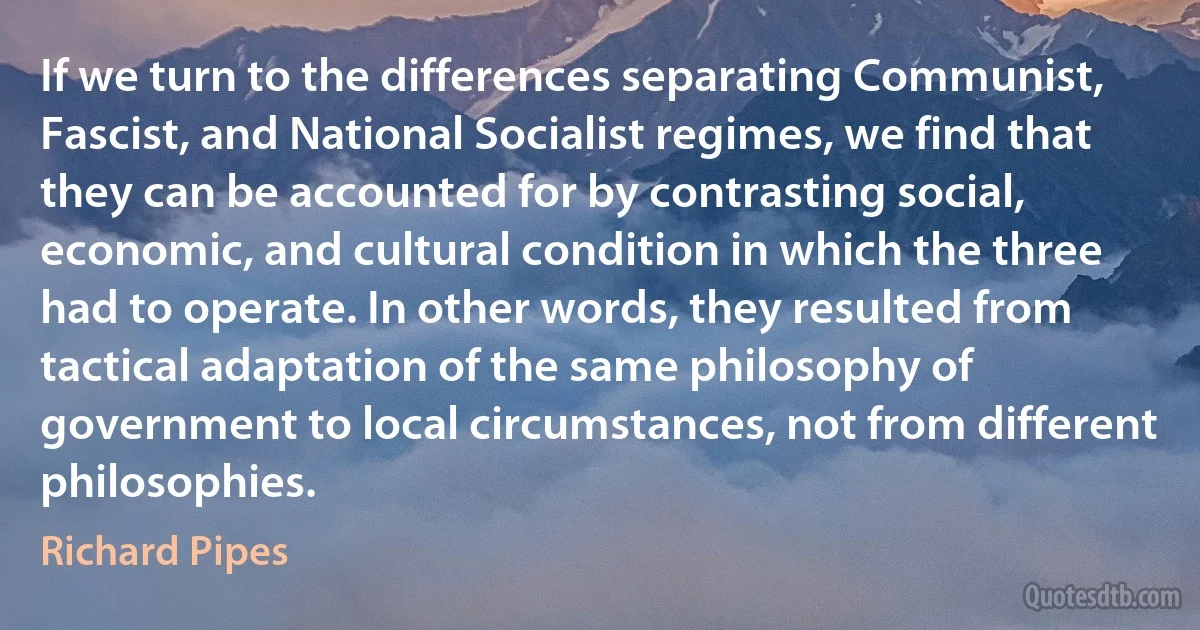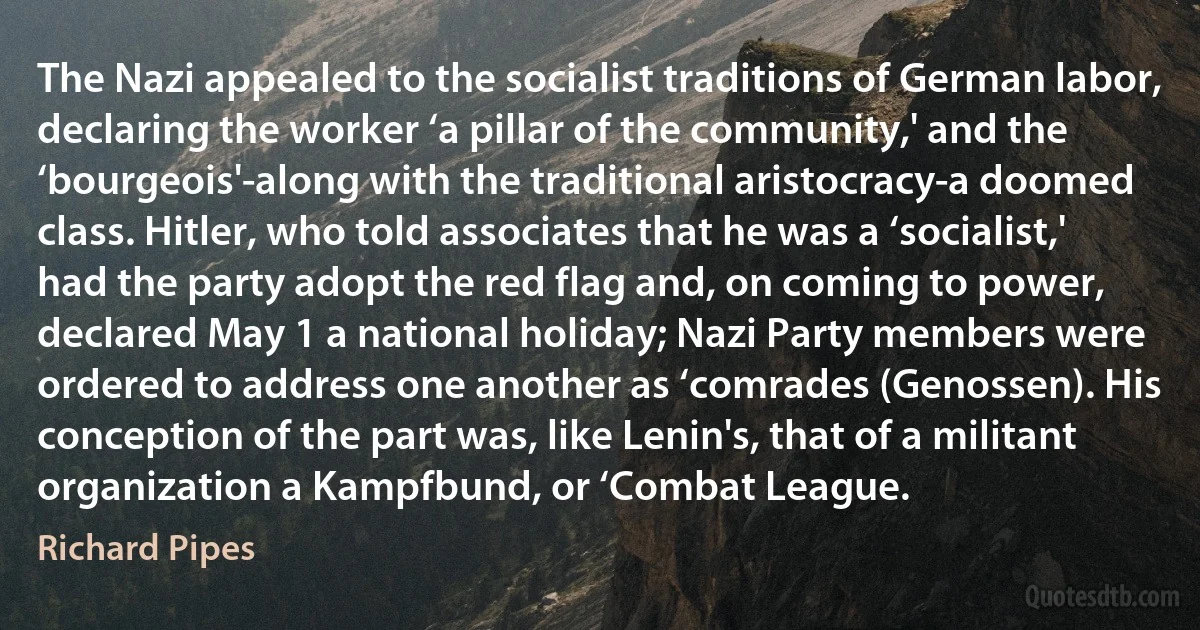Richard Pipes quotes
Hitler did not have Mussolini's revolutionary socialist background... Nevertheless, he shared the socialist hatred and contempt for the 'bourgeoisie' and 'capitalism' and exploited for his purposes the powerful socialist traditions of Germany. The adjectives 'socialist' and 'worker' in the official name of Hitler's party ('The Nationalist-Socialist German Workers' Party') had not merely propagandistic value... On one occasion, in the midst of World War II, Hitler even declared that 'basically National Socialism and Marxism are the same.

Richard Pipes
Given the opportunity, Mussolini would have been glad as late as 1920-21 to take under his wing the Italian Communists, for whom he felt great affinities: greater, certainly, than for democratic socialists, liberals and conservatives. Genetically, Fascism issued from the 'Bolshevik' wing of Italian socialism, not from any conservative ideology or movement.

Richard Pipes
Because he did not care about his country, Lenin was prepared to promise everybody whatever they wanted without giving much thought to the future. The peasants wanted private land for their communes? Let them take it: eventually all the land will be confiscated and collectivized anyway. Until then, ‘looting the loot' will win over, or at least neutralize, the peasantry. The workers demand to run the factories? Even though ‘workers' control is a detestable syndico-anarchist slogan, there is no harm in granting their desires-for the time being. Once industries have been nationalized and subjected to general economic plan of production, ‘workers' control' will vanish of itself.

Richard Pipes
The three totalitarian regimes differed in several respects... What joined them, however, was much more important than what separated them. First and foremost it was the common enemy: liberal democracy with its multiparty system, its respect for law and property, its ideal of peace and stability. Lenin's, Mussolini's and Hitler's fulminations against ‘bourgeois democracy' and the Social Democrats are entirely interchangeable.

Richard Pipes
A theoretical defense of private property as a feature of Natural Law, however, was not fully made until the sixteenth and seventeenth centuries, the age of Jean Bodin and Hugo Grotius. But that the idea occurred to Romans is evident from Cicero's argument that government could not interfere with private property because it had been created in order to protect it.

Richard Pipes
Last but not least, the factor which prevented Trotsky from succeeding Lenin was his Jewishness. Trotsky hated to be reminded that he was a Jew. Whenever anybody come to him asking him to help other Jews, he would explode in anger and insist that he was not a Jew but an ‘internationalist.' On one occasion he said that the fate of the Jews concerned him as little as the fate of the Bulgarians.

Richard Pipes
On the eve of its coming to power, industrial workers composed nearly one-third of the Nazi Party membership and constituted its largest occupational groups. The party adopted the Red Flag, declared May 1 a paid national holiday, and required its members to address one another as Genossen or ‘comrades.

Richard Pipes
Both Fascist Italy and Nazi Germany did indeed allow-or, more accurately, tolerate-private property. However, it was ‘property' in a peculiar and very restricted sense-not the virtually untrammeled private ownership of Roman law and nineteenth–century Europe, but rather conditional possession, under which the state, the owner of last resort, reserved to itself the right to interfere with and even confiscate assets which in its judgment were unsatisfactorily used.

Richard Pipes
Marxism and Bolshevism, its offspring, were products of an era in European intellectual life that was obsessed with violence. No-one embraced this philosophy more enthusiastically than the Bolsheviks: ‘merciless' violence, violence that strove for the destruction of every actual and potential opponent, was... the only way of dealing with problems.

Richard Pipes
[For the Romans] an essential element of the Law of Nature is the equality of man, specifically, equality before the law, and the principle of human rights, including the rights to property, which antedated the state, and thus are independent of it. Fifteen hundred years later these ideas would furnish the philosophical cornerstone of Western democracy.

Richard Pipes
From 1920 onward, [Mussolini] depicted Italy as a ‘proletarian' nation exploited by hostile ‘plutocratic' countries determined to deny her her rightful place under the sun. The true class struggle, according to Fascist doctrine, was the struggle between nations. Fascism strove to surmount narrow class allegiances: all classes had to subordinate their private interests to those of the nation and collaborate against the external enemy.

Richard Pipes
In Western Europe since Roman times, private property was considered sacrosanct. The principle enunciated by the Roman Stoic philosopher Seneca that kings rule by the will of the people became fundamental to Western civilization, together with private property, which was the main source of productive wealth.

Richard Pipes
Stoicism's contribution to the shaping of the Western intellectual tradition is probably second only to that of Jewish monotheism. If monotheism advanced the revolutionary concept of an all-powerful and all-pervasive but non-material God ruling the universe, the theory of Natural Law posited that God's universe was rational and capable of being grasped by human intelligence.

Richard Pipes
Communism, Fascism and National Socialism exacerbated and exploited popular resentments-class, racial and ethnic-to win mass support and to reinforce the claim that they, not the democratically elected governments, expressed the true will of the people. All three appealed to the emotion of hate.

Richard Pipes
According to Marx, the evolution of capitalism would inevitably lead to the pauperization of the proletariat and then, just as inevitably, to its radicalization. It is interesting that Bento Mussolini arrived at an identical judgment ten years later. Before the outbreak of the first World War, Mussolini had been the closest analogue to Lenin in the European socialist movement, being equally revolutionary and anti-reformist. He was the Lenin of the Italian Socialist Party with the difference that, whereas Mussolini managed to rally behind him a revolutionary majority and expel the reformers, in Russia, Lenin found himself leading a minority and forced to break away from the Social-Democratic Establishment.

Richard Pipes



